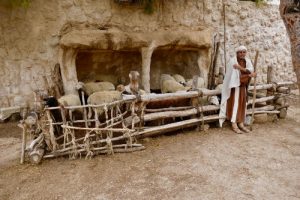HOMILY EASTER SEASON WEEK 04 01 – Year II
Jesus as Good Shepherd and Gate to Eternal Life
(Acts 11:1-18; Ps 42; Jn 10:1-10)
***************************************************
Today’s readings invite us to place our faith in Jesus as the Good Shepherd and experience him as the Gate of salvation.

1 c. Nazareth village shepherd
The New Interpreter’s Bible claims that the images of Jesus as the Gate, and the Good Shepherd, are intensely relational; they have no meaning without the presence of the sheep. These images reveal who Jesus is in relation to those who follow him. The identity of Jesus and the identity of the community that gathers around him are inextricably linked. Who Jesus is with, determines who the community is. All who gather around Jesus receive their identity as members of the flock. The community that gathers around Jesus are the ones who share in the mutual knowledge of God and Jesus, whose relationship to Jesus is modelled on Jesus’ relationship to God.
Listening to Jesus’ voice is the source of its unity. By taking Jesus as its point of access to God, the community receives abundant life. Most important, the community receives its identity through Jesus’ gift of his life for them. To be a member of Jesus’ flock is to know one’s self as being among those for whom Jesus is willing to die.
Jesus’ assertion that he is the good shepherd, using the same Ego Eimi – “I Am” that God used to identify God’s self to Moses, is a claim to Messiahship. According to Barclay, Jesus as the Messiah and Good Shepherd does the following:
Jesus lay down his life out of love as a good shepherd. No one really “killed” Jesus; he freely gave up his life. A French soldier who, when told by the doctor that he had lost his arm, said, “I didn’t lose my arm – I gave it, for France.”
Jesus also offers a life of intimacy, a communion of life, the experience of an intimate relationship with him, fostered especially through contemplative prayer. The relationship we have with Jesus is the same as the relationship we have with the Father. Third, Jesus gathered his disciples into a unity through faith in him. Only through faith in Jesus is there any chance for world unity, because in him we are all brothers and sisters, with God as our father. We are all related.
The shepherds of official Judaism at the time of Jesus thought they could achieve unity by promoting national pride, maintaining the privileges of the “higher” classes, and discriminating against non-Jews. But Jesus unites his people solely by attracting them to himself, and by letting people experience who he is. All who are attracted by him, who recognize his voice, and believe in his word, are his. Think of the A.A. slogan, “Attraction, not promotion.”
“All who came before me” refers to those who discount and do not listen to the Old Testament prophets and thus attempt another means of access to the sheepfold, through power and control. John also has in mind the many “saviours” of the Hellenistic world who teach a way of salvation apart from Christ. Jesus is the means to salvation. The promise of entering through the gate to find salvation echoes the psalms, and identifies Jesus as the point of access to God for the flock. Jesus comes to bring life.
In the first reading, we see the first chief shepherd of the Church, St. Peter, growing in awareness of what it means to follow Jesus who is Kyrios, Lord of all creation. Aware of the laws about unclean foods in the Old Testament, he is shocked by his vision that all foods are clean. The fact that it occurs three times underlies the importance and ultimate authority of this vision. That authority is seconded by the appearance of three men from Caesarea, and by the prompting of the Holy Spirit.
How does one reconcile this message contradicting so much Old Testament teaching? A natural explanation may be those prohibitions were necessary to safeguard the life of the people when keeping food fresh was a challenge. One could also see this as a fulfilment of all those Old Testament laws – the supreme law of faith in Jesus and his law of love has made those ritual laws unnecessary. As St Paul put it in Galatians 5:14, all the previous teachings boil down to one sentence: “Love one another as you love yourself.”
An interesting note here reveals that the view “scripture alone” is not found in scripture. The manner of establishing the first traditions in the early church was in collaboration with the Holy Spirit, exemplified by Peter in this reading. Elsewhere in Acts, we read how the apostles could say “We and the Holy Spirit decided…” That is the foundation of the life of the Church to this day – balancing the written word of God with the lived word of God, as in the early church.
The Eucharist is a shepherd’s meal, foreshadowed by the Passover Event in the Old Testament where the people put the blood of a lamb on their doorposts and ate the flesh of the lamb as pilgrims: “This is how you shall eat it: your loins girded, your sandals on your feet, and your staff in your hands; and you shall eat it hurriedly. It is the Passover of the Lord” (Exodus 12:11). We re-enact this event when we process up to receive communion – this is our new Passover meal.
May our celebration today deepen our relationship with Jesus the Good Shepherd, allow us to enter more fully into his pasture through him as Gate, and live life more fully as the New People of God.



